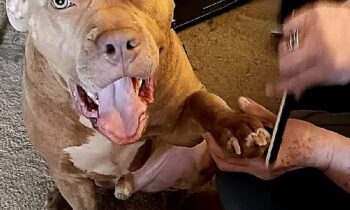
What is a dog behaviorist? Look through the ads in your local paper, phone book, or online, under dog training. How many of these listings include the words “behaviorist”? What does that word mean?
A dog behaviorist is a person who works in modifying or changing behavior in dogs. They can be experienced dog handlers who have developed their experience over many years of hands-on experience, or have formal training up to degree level. Some have backgrounds in veterinary science, animal science, zoology, sociology, biology, or animal behavior, and have applied their experience and knowledge to the interaction between humans and dogs. Professional certification may be offered through either industry associations or local educational institutions. There is, however, no compulsion for behaviorists to be a member of a professional body, nor to take formal training.
—Wikipedia
Strictly speaking, the Wikipedia definition is accurate. Unfortunately, though, the general public is not aware that the term “behaviorist” does not necessarily refer to a person with formal training of any kind, nor to a person who’s been tested by a certifying organization. Your next-door neighbor, the one who’s never owned a dog, can say he’s a behaviorist . . . and he can start giving “professional” advice to anyone who’ll take it.
Luckily, most of our neighbors have no interest in that job. They may give us “dog training” advice over the back fence (whether they know anything about dogs or not), but they’re not advertising their services on the internet, nor are they charging for their words of wisdom.
Sadly, that is not true of all our neighbors. Listings appear in almost every local publication for the services of “dog behaviorists.”
Call me old-school if you will, but I think that’s not ethical.

Photo by Marcy Rauch
Frania Shelley-Grielen http://animalbehaviorist.us
The pet services industry in the United Sates is unregulated. The only professionals working with animals who are required to be licensed are veterinarians and veterinary technicians. That’s it. Veterinary studies do not typically include behavior, so a veterinary behaviorist would technically have additional academic credentials in behavior—DVMs, Sophia Yin’s Masters in Animal Behavior, and Karen Overall’s Ph.D. While I work professionally as an animal behaviorist and trainer myself and have a Masters in Animal Behavior and am licensed by the New York State Education Department as a Pet Care Technician Teacher, my qualifications are the exception and not the rule. Basically, anyone can call themselves a trainer or behaviorist without any formal background or even private certification. Formal academic training or licensing in pet services, including training, handling, and grooming, has been introduced [as a requirement] in several states, but has yet to pass. The certifications that abound are from myriad private organizations that have individual requirements for the certifications individuals can apply for. Some are better than others.
Summer Storm Kingery
I have mixed feelings on behaviorists. I believe Ph.D. ethologists should use the term behaviorist (not necessarily canine). I believe that some masters degrees should use the term behaviorist, but that is a stricter sense to me and should have some licensing requirement. I do personally have issues with associates and bachelors degrees using “behaviorist.” I do feel empathy for those who have worked their assets off essentially developing an education equivalent to the above by alternative means. I am in a similar situation in vet med. Multiple veterinary behaviorists have offered me the opportunity to do non-conforming residencies because my education in ethology and my alternative pursuit of knowledge and experience often puts me in a similar position to their third-year educational residents. I simply cannot afford to, and I accept that as a sacrifice I make for the term “veterinary behaviorist” to have the integrity it needs for the future well-being of my profession and for patients.
Here’s some specific technical terminology from a website that’s an excellent source of information, technical or not—a detailed list of what’s required in the United States for licensing and certification of animal trainers and behaviorists:
https://drsophiayin.com/blog/entry/animal-trainers-and-behaviorists-licensing-and-certification/
What is a veterinary behaviorist? How does a veterinary behaviorist differ from a dog trainer? Here’s a well-written full page of explanations from The American College of Veterinary Behaviorists:
http://www.dacvb.org/about/faqs/
Most important, only someone with a veterinary degree can prescribe medications for dogs.
Monique Feyrecilde Prescribing medications for animals in the U.S. without a current DVM or VMD license in the state in which you are prescribing is practicing veterinary medicine without a license—for behavior medications or any other medication. This applies to all legend drugs (those are all labeled in the U.S. “For use by or on the order of a licensed veterinarian.”) and all prescription medications used off-label for animals.
Lori Leah Monet Federal law requires a licensed doctor to prescribe medications controlled and approved by the [U.S. Food and Drug Administration] FDA. Further, you need to be licensed in the state where you write the prescription and the pharmacy must be able to legally sell in that state. Also, with controlled substances C-II to C-V, one must be licensed by the [U.S. Drug Enforcement Administration] DEA. (Few vets hold C-I licenses except researchers). I suspect some states are more lax. In Colorado, we once allowed people who were not veterinarians to treat animals with non-traditional methods like chiropractic or holistic. Now the law states this has to be done under the supervision of a licensed vet.
Jody Anne Depends on what you’re prescribing. If you’re referring to prescribing nutrition and/or medication, then yes. That is practicing medicine and so can only legally be done by one with a license to practice veterinary medicine (and this includes over-the-counter supplements that can be purchased at local pet stores or online). If you’re talking about prescribing a training protocol, behavior plan, or types of enrichment/management for behavior issues, then I think any qualified trainer/behavior consultant can prescribe that.
Monique Feyrecilde There is a difference between a behavior-modification plan and a treatment plan for a diagnosed behavior disorder or illness. I think that’s the tough line to define for many people, and we will continue to see these definitions, protocols, and teamwork evolve over time.
For the pet owner, the difference between a veterinary behaviorist and someone who is not a veterinary behaviorist may not seem important—until your pet needs a prescription or a physical examination. When one attempts to deal with the behavior of an animal, it is critical first that the animal have a full physical examination by a veterinarian with that behavior in mind. In other words, when you make the appointment with your veterinarian, you say, “Fido has been very nervous lately. He’s growling when we touch him, and he’s drooling a lot. I want to find out why.”
When you’re looking for answers about your dog’s behavior—especially if it’s behavior that’s unacceptable to you, dangerous to the dog or others, or possibly indicative of an underlying physical problem so far undiagnosed—that’s always where you start. You start by figuring out if there’s a possible physical cause for the behavior.
You eliminate the possibility of a physical cause, if that can be done, or you deal first with the physical cause, then with the behavior, if that’s possible. Fido may well be nervous, growling when you touch him, and drooling because he’s got bad teeth. Work with your veterinarian to eliminate that issue. Most likely, dental surgery will be step one, and upgraded dental care for the rest of Fido’s life will be on the list. Once his physical health is back to normal, you can deal with Fido’s behavior.
When you’re looking for help with a dog’s behavior, what’s a good source for referrals? Your veterinarian, of course—after you’ve eliminated the chance that the behavior has a physical cause, or you’ve dealt with the physical cause appropriately.
You might say, “Now that his dental issues have been resolved, Fido isn’t drooling and his nervousness has decreased, but he’s still growling when we touch him. If we’re as sure as we can be that’s there’s no physical cause, what can we do about this behavior?”
Your veterinarian may or may not know all the qualifications of the person or persons to whom you’re referred, but you can be certain your veterinarian knows if that person is a veterinary behaviorist. However, a veterinary behaviorist may not practice in your area, and traveling away from home for a consultation may simply not be in your budget. In that case, your veterinarian may well suggest that you contact a dog trainer.
However the person you’re referred to self-identifies, the responsibility for due-diligence is, as always, yours. To begin with, does the person list what qualifies them to use the terms with which they describe themselves and their experience?
▪ For example, I would suggest a good laugh and a loud “Next!” for anyone who describes themselves as a “dog psychologist.” That is not a real thing!
▪ I’m also always highly suspicious of totally made up words. There is also no such thing as a “dog behavioralist,” even though all those extra letters might make the word look more important. (It makes the person using that word look . . . inexperienced.)
▪ I’d urge further caution even with someone who claims to be a “dog behaviorist,” if they list no education or experience. That’s your unknowledgeable next-door neighbor, trying to make a buck. (And if they do have education and experience, yet fail to list it . . . well, their bad.)
Buzz words used to attract business are not good descriptors of the professional services provided by educated and experienced practitioners. You need to see a full résumé, with accompanying certifications and degrees, plus letters of reference from satisfied clients and referrers. With that information, you’ll know exactly what services the person can—and cannot—offer to help you and your dog.



